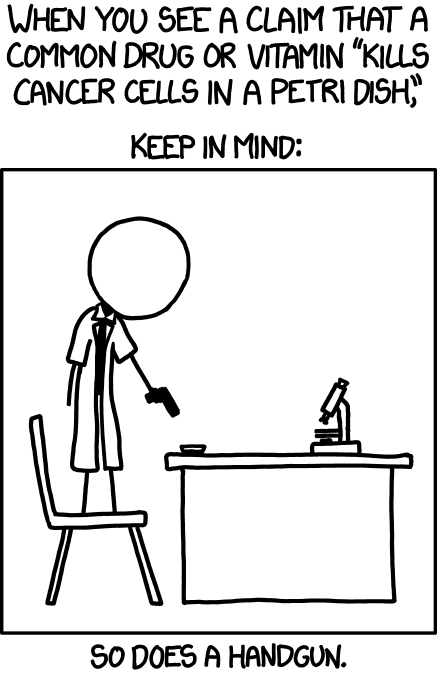In this study, the scientists simulated the process of spaced learning by examining two types of non-brain human cells — one from nerve tissue and one from kidney tissue — in a laboratory setting.
These cells were exposed to varying patterns of chemical signals, akin to the exposure of brain cells to neurotransmitter patterns when we learn new information.
The intriguing part? These non-brain cells also switched on a “memory gene” – the same gene that brain cells activate when they detect information patterns and reorganize their connections to form memories.
Isn’t the title misleading? A cell switching on the same gen neurons use to connect, if exposed to substance used to transmit information, doesn’t mean it stores or transmits any memories. It seems it doesn’t even do anything more, like forming dendrites or “answering” chemically.
Guess that’s just a side-effect of how the gen is exposed.
It’s more than that. People who have had heart transplants can inherit memories and personality traits from the donor. Cells remember more than they let on and can pass these memories to the recipient.
See this study. I think it’s safe to say we have some empirical evidence for this. In the linked study, there’s a kid who received a heart from another kid who died trying to retrieve a power ranger and somehow the donor knew that without anyone telling him. Another kid received a heart from a kid who drowned and he became afraid of water.
Sounds like utter bullshit to be honest with you.
At the bottom of that article you linked:
“Research data for this article Data not available / No data was used for the research described in the article”If I read the cited sources and they turn out to be a bunch of untested hypotheses based on poorly conducted studies… I’ll be mad.
Just skimming through it makes a bad first impression.
…I’m not even trying to be derisive. I’m just really angry at how much “there’s a study” has become “there’s proof”. And I shouldn’t even be mad because communicating that difference should be the authors’ job.
If you value your time, don’t read any further because I’m just going to vent a little:
So I lack any formal education (apart from ficking school). The best thing I can say about myself is that I can hold and mostly understand a conversation with people who are actually educated in their field.
But some studies are bad. Like bad-bad. So bad that I think, most people who can read should be able to recognize their flaws if they actually read them.
For example:
I read a study a while back about genetic (as opposed to learned) prepositions of monkeys in relation to their biological sex and preference for toys.
The methodology was bad, but here’s the shittiest part imo: At the end of the study, the researchers found that of the 130 or so monkeys, only about half showed any preference for any kind toy. So the researchers excluded the unbiased monkeys from the test. Of the remaining monkeys, still only the males showed any preference for the “male” toys. So the females were also excluded. In the end, only 30 monkeys actually counted, because they showed the hypothesized difference in their preferences. And even those only showed a delta of 10-30% in the time they spent with the toys.
The study should have concluded that most monkeys don’t give a shit if a toy has wheels (like a shopping cart, which apparently makes it a “male” toy) or if it’s soft, like a plush (which is “female” because boys would never touch a plushy, of course).
Instead, they found that their hypothesis turned out to be correct, after disregarding anything that invalidated their hypothesis.
Where did I get this study from? From social media, of course. Where a bunch of meat heads “proved” that all women genetically want to be tradwives and trans people don’t exist or some shit.
Fuck everything about this.
Not to be a debbie downer here, but it’s important to keep in mind that unless expressly stated otherwise, so-called discoveries that are only published in out-of-the-way (ie. not respected scientific journals) have usually not been peer reviewed or had their results replicated, which is the entire point of the scientific method.
Here’s the paper.
Awesome. Thanks!
I suppose that explains survival instinct
Its interestng, but kidney cells are not exposed to patterns of neurotransmiters like nerve cells are. Cells can be reprogramed to be stem cells as well with the right pattern od signals but that does not mean that it really happens in the body.
Kwisatz Haderach here we come
So hold on a minute - does this mean there might be some truth to the whole “eat your fallen enemy to gain experience” thing? That’s wild.
No, because you’re eating the flesh, so you’re digesting it.
This is more relevant to organ transplants.
Apparently, it’s a known phenomenon that some organ transplant recipients seem to inherit some traits and even memories of organ donors.
Wow, these examples are so cool.
Food Preferences:
- developed aversion to meat after receiving a heart from a vegetarian donor.
- experienced nausea after meals post-transplant from a donor with irregular eating habits.
- developed a taste for green peppers and chicken nuggets, foods favored by her donor.
Musical Preferences:
- began enjoying loud music post-transplant.
- developed a love for music after receiving a heart from a musician.
- started appreciating classical music, previously disliked, after transplant.
Sexual Preferences:
- Male recipient of a heart from a lesbian artist experienced heightened desire toward women.
- Lesbian recipient of a heterosexual woman’s heart found attraction to men.
Other Preferences and Aversions:
- Landscape artist’s heart recipient developed interest in art.
- Dancer’s heart recipient shifted color preferences to cooler tones.
- Fear of water developed post-transplant from drowning victim.
Memories:
- describes sudden unusual tastes accompanied by thoughts about their donor’s identity and life experiences.
- feels tactile sensations corresponding to the impact of the car accident that killed their donor.
- experiencing flashes of light and heat resembling the trauma suffered by their donor, who was shot in the face.
- describes a vivid dream of reckless driving, mirroring the circumstances of their donor’s fatal motorcycle accident.
Some recipients even experience dreams or memories aligning with their donor’s identity, such as a woman envisioning a young man named Tim during a dream and later discovering her donor’s name as Tim Lamirande
Unfortunately, though, I don’t see any mention of how certain they were that the recipients didn’t learn these things before experiencing them
Eating a dictionary to improve your vocabulary would be equally effective to that theory, and for many of the same reasons. (As far as information transfer is concerned)
naw. its more like the nerve pathways through the body also have their own node-weighting long before they get to the brain. those are used in process sometimes allowing for memory-like function
its still a generated system that you cant just eat
Closer to that whole organ transplant affecting someone’s personality I guess
Are you sure I can’t eat it? We should test this… for science.
Are you sure I can’t eat it? We should test this… for science.
The question then being: would it still be considered science if it’s not eaten raw but cooked and, say, accompanied with some wine?
And fava beans.
Doesn’t count. They have to be slain in honorable battle.
Memory is stored in the balls
And when you fuck someone, you’re giving them your memories.
Vaginas remember the bad balls.
And if they swallow a load….
deleted by creator
Just to recap, sperm, pee, microplastics, and memories are stored in the balls? Am I missing anything? I can’t remember. Maybe my balls are too full of microplastics to recall.
Urine is not stored in the balls. I’m a doctor you can trust me on this
Even if you weren’t a doctor I’d agree with you. I was taught it’s stored in the bladder in ninth grade. Pretty sure that continues throughout your adult life. Lol
I thought you were referencing the conversation on Reddit or Twitter or something where someone had said “I’m a doctor, pee is definitely not stored in the balls” and then a really long argument ensued where the dude was pretty adamant that pee is stored in the balls. I just wanted to be the Dr
You forgot about the wolves.
i forgot i put those there to control the deer population
The Soul is also stored in the balls.
Do you think that’s why we often tell god that we’re cumming?
I keep cement in mine
Mine are filled with brass
Live bees here
Yukon gold potatoes.
I’m sure you could fit a few dollars in loose change in there to.
Data.

Still better that “pee is stored in the brain”
Well some species do potentially have “genetic memories” so maybe some stuff actually could be
in a laboratory setting.

Technically, a handgun also kills cancer in vivo. The problem is the cost to the host body.
Okay but what you’re saying is if I hired a good enough marksman to shoot the cancer out of my body without killing me then that’s a good thing right?
I mean, that’s basically what we do with gamma radiation and chemotherapy, just a little bit more ballistic, right?
Exactly! The only difference is that those use very tiny bullets.
Chemo only applies if it’s doped with a radionuclide, otherwise it’s just regular poison.
I was wondering if there is a link between cellular memory and how trauma is encoded into DNA?
“Muscle memory” is real.
As if haven’t know for a century that immune system has the ability to both form memories and problem solve, that rivals the brain. The body being able to adapt to external stimuli isn’t anything groundbreaking.
Is there an element of literality to the term “muscle memory”?
Yes, insofar as many reflexive actions, enervation and fiber recruitment thresholds respond to training, such that they “remember“ actions you have performed many times before. There are many clusters of nerves throughout the body called ganglia that are responsible for low-latency control of various functions that would entail too much delay when controlled entirely by the brain.
Generally, the minimum input-process-activation turnaround time of the brain is about 4 hz (240-250 ms) which is too slow for many applications of motor function. But the “co-processing” allowed by the extended nervous system enables the body to, with practice, execute far more rapid and complex action sequences in response to local stimuli. Some actions can be triggered and completed before a signal even makes it to the brain.
Generally, the minimum input-process-activation turnaround time of the brain is about 4 hz (240-250 ms) which is too slow for many motor functions. But the “co-processing” allowed by the extended nervous system enables the body to, with practice, execute far more rapid and complex action sequences in response to local stimuli. Some actions can even be triggered and completed before a signal makes it to the brain.
Thank you. For some reason it makes me happy to know that.
Its not the same memory as your brain. your life story is not in your non nerve cells. they have memory the same as yeast has memory but everyone is aware of how we have muscle memory in reptitive tasks.
I think muscle memory is just a phrase, but the training that makes and embed the “muscle memory” is essentially nural
yeah sorry I still feel that is neural just not all the way to the brain. I guess what I was trying to say if the article is not that cells hold your memory but that they hold their type of memories is a similar way.
Kind of like how there’s taste buds in our lungs.

And your rectum.
“The Body Keeps the Score”






















